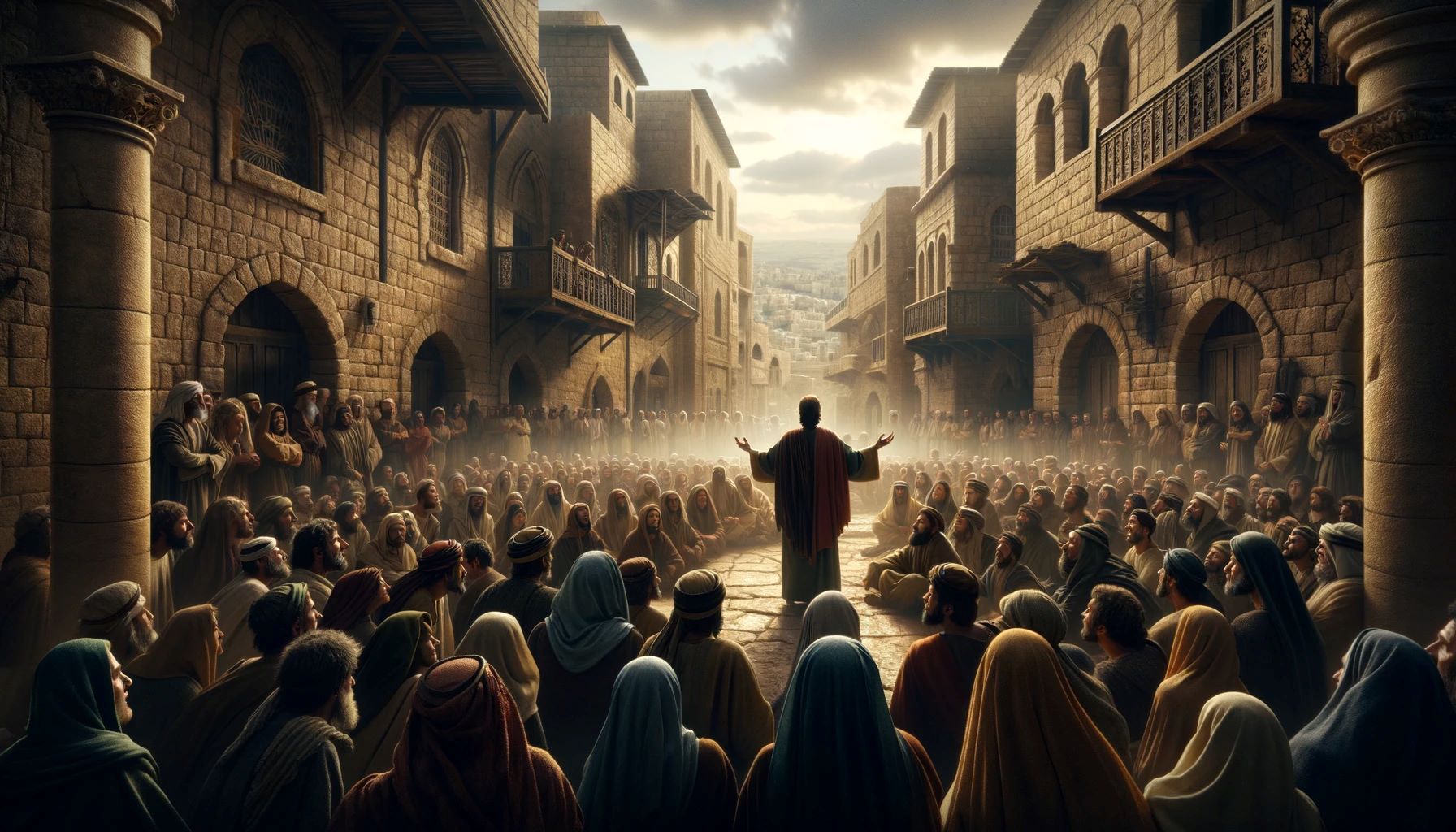Home>Theology and Spirituality>What Is The Baptist Faith And Message


Theology and Spirituality
What Is The Baptist Faith And Message
Published: February 20, 2024
Jason DeRose, Managing Editor at Christian.net, uses his expertise in religion and journalism to deepen understanding of faith's societal impacts. His editorial leadership, coupled with a strong academic background, enriches the platform’s diverse content, earning him recognition in both journalism and religious circles.
Discover the Baptist Faith and Message, a statement of beliefs and practices rooted in theology and spirituality. Explore its significance and impact today.
(Many of the links in this article redirect to a specific reviewed product. Your purchase of these products through affiliate links helps to generate commission for Christian.net, at no extra cost. Learn more)
Table of Contents
Introduction
The Baptist Faith and Message serves as a foundational document that outlines the beliefs and practices of the Southern Baptist Convention, a prominent Christian denomination with a rich history and a significant impact on modern Christianity. This comprehensive statement of faith provides a framework for understanding the theological principles and doctrinal positions that guide the beliefs and practices of Baptist congregations.
The Baptist Faith and Message is not only a historical artifact but also a living document that continues to shape the identity and mission of Southern Baptists. It reflects the core convictions and theological perspectives that have defined the denomination since its inception. Understanding the origins, core beliefs, and contemporary relevance of the Baptist Faith and Message is essential for gaining insight into the distinctive characteristics of the Southern Baptist tradition and its contributions to the broader tapestry of Christian faith.
As we delve into the history, core beliefs, and application of the Baptist Faith and Message, we will uncover the enduring significance of this doctrinal statement in shaping the faith, values, and practices of Southern Baptists. Moreover, we will explore how these foundational principles have influenced the denomination's engagement with contemporary issues and its role in the broader Christian community. Through this exploration, we can gain a deeper appreciation for the Baptist Faith and Message and its enduring impact on the lives of believers and the trajectory of Christian thought and practice.
Read more: Who Wrote The Baptist Faith And Message
History of the Baptist Faith and Message
The history of the Baptist Faith and Message is deeply intertwined with the evolution of the Southern Baptist Convention (SBC) and the theological developments within the Baptist tradition. The SBC, founded in 1845, has played a pivotal role in shaping the beliefs and practices of millions of Baptists across the United States and beyond. The need for a comprehensive statement of faith became increasingly apparent as theological debates and cultural shifts prompted a clarion call for doctrinal clarity and unity within the denomination.
In response to these challenges, the Baptist Faith and Message was first adopted in 1925 at the annual meeting of the SBC in Memphis, Tennessee. This initial version was a concise statement that affirmed key doctrinal tenets such as the inspiration and authority of Scripture, the Trinity, and the atonement. However, as theological controversies continued to simmer within the denomination, a revised edition of the Baptist Faith and Message was adopted in 1963 to address emerging theological challenges and provide a more comprehensive theological framework for Southern Baptists.
The 1963 revision expanded the doctrinal scope of the Baptist Faith and Message, addressing issues such as the priesthood of believers, the nature of the church, and the relationship between God's sovereignty and human responsibility. This updated statement of faith sought to articulate the distinctive theological emphases of Southern Baptists while also fostering greater theological coherence and unity within the denomination.
In 2000, the Baptist Faith and Message underwent another significant revision, reflecting the ongoing theological reflection and contextual engagement of the SBC. This latest iteration reaffirmed traditional Baptist convictions while also addressing contemporary issues such as gender roles, family, and the sanctity of human life. The 2000 version of the Baptist Faith and Message continues to serve as a guiding document for Southern Baptists, providing a robust theological framework that informs their beliefs, practices, and engagement with the world.
The history of the Baptist Faith and Message reflects the ongoing theological dialogue and doctrinal refinement within the Southern Baptist Convention. It stands as a testament to the denomination's commitment to preserving its theological heritage while engaging with the challenges and opportunities of the present age. The evolution of this doctrinal statement underscores the dynamic nature of theological reflection and the enduring significance of the Baptist tradition within the landscape of Christian faith.
This section provides a glimpse into the historical trajectory of the Baptist Faith and Message, illuminating the theological currents and formative events that have shaped its development and enduring relevance within the Southern Baptist Convention.
Core Beliefs of the Baptist Faith and Message
The Baptist Faith and Message encapsulates the core beliefs that define the theological framework and doctrinal convictions of the Southern Baptist Convention. At its heart, this statement of faith reflects the foundational principles that guide the beliefs, practices, and mission of Southern Baptists. Central to the Baptist Faith and Message are several key doctrinal emphases that underscore the denomination's theological identity and its understanding of the Christian faith.
Authority of Scripture
The Baptist Faith and Message affirms the absolute authority and infallibility of the Bible as the inspired Word of God. It emphasizes the divine origin, trustworthiness, and sufficiency of Scripture as the ultimate standard for faith and practice. This foundational belief underscores the centrality of God's Word in shaping the beliefs and conduct of Southern Baptists.
The Trinity
Central to the Baptist Faith and Message is the affirmation of the triune nature of God—Father, Son, and Holy Spirit. This foundational doctrine underscores the belief in one God eternally existing in three distinct persons, each fully and equally God. The Trinitarian understanding of God serves as a cornerstone of the denomination's theological framework.
Read more: What Is The Message Of John The Baptist
Salvation by Grace through Faith
The Baptist Faith and Message emphasizes the doctrine of salvation by grace through faith in Jesus Christ. It underscores the belief in the atoning work of Christ on the cross and the necessity of personal faith in Him for salvation. This core belief reflects the evangelical convictions that have historically defined the Southern Baptist tradition.
Priesthood of Believers
Another key emphasis of the Baptist Faith and Message is the priesthood of all believers, affirming the direct access of every believer to God through Jesus Christ. This doctrine underscores the individual responsibility and privilege of every Christian to serve God and minister to others, reflecting the denomination's commitment to the autonomy of the local church and the spiritual equality of all believers.
The Church
The Baptist Faith and Message articulates the beliefs about the nature and purpose of the church, emphasizing its identity as a community of redeemed individuals called to worship, fellowship, discipleship, and mission. It underscores the autonomy of the local church and its role as the primary vehicle for carrying out the Great Commission.
Last Things
The Baptist Faith and Message also addresses eschatological beliefs, affirming the future return of Christ, the final judgment, and the ultimate triumph of God's kingdom. This doctrinal emphasis provides a framework for understanding the culmination of God's redemptive plan and the hope that sustains the faith of Southern Baptists.
The core beliefs articulated in the Baptist Faith and Message serve as theological touchstones that define the identity, mission, and witness of the Southern Baptist Convention. These foundational doctrines shape the beliefs and practices of Southern Baptists, providing a robust theological framework that informs their engagement with the world and their commitment to advancing the kingdom of God.
Read more: What Is The 1689 Baptist Confession Of Faith
Key Differences from Other Christian Denominations
The Baptist Faith and Message encompasses distinctive theological emphases that set the Southern Baptist tradition apart from other Christian denominations. While there are areas of theological convergence and shared convictions among various Christian groups, several key differences highlight the unique theological identity of Southern Baptists.
Believer's Baptism by Immersion
One significant difference lies in the practice of believer's baptism by immersion. Unlike some Christian denominations that practice infant baptism or baptism by sprinkling or pouring, Southern Baptists adhere to the belief that baptism is reserved for individuals who have professed a personal faith in Christ. The mode of immersion symbolizes the believer's identification with Christ's death, burial, and resurrection, reflecting the denomination's commitment to the autonomy of the local church and the priesthood of all believers.
Congregational Polity
Another distinguishing feature is the congregational polity embraced by Southern Baptists. In contrast to hierarchical forms of church governance found in other Christian traditions, Southern Baptist churches operate with a high degree of autonomy, allowing each congregation to govern its affairs independently. This congregational polity underscores the belief in the spiritual equality of all believers and the local church's authority in matters of faith and practice.
Emphasis on Evangelism and Missions
Southern Baptists are known for their fervent commitment to evangelism and missions. The denomination places a strong emphasis on sharing the gospel and making disciples both locally and globally. This missionary zeal is manifested through cooperative efforts to support missions, church planting, and humanitarian endeavors, reflecting the denomination's conviction that the Great Commission is a mandate for every believer and the collective responsibility of the church.
Read more: What Is The Main Message Of Advent?
The Priesthood of Believers
The Baptist Faith and Message underscores the priesthood of all believers, affirming the direct access of every individual to God through Jesus Christ. This theological emphasis stands in contrast to hierarchical priesthood structures found in some Christian traditions, highlighting the denomination's commitment to the spiritual equality and individual responsibility of every believer in serving God and ministering to others.
Separation of Church and State
Southern Baptists historically advocate for the separation of church and state, affirming the autonomy of the local church and the freedom of religious expression. This commitment to religious liberty and the separation of church and state distinguishes the denomination's approach to civic engagement and public policy from that of some other Christian groups.
These key differences underscore the unique theological and ecclesiological distinctives of the Southern Baptist tradition, shaping its identity, mission, and engagement with the broader Christian community and society. While there are areas of theological unity and shared mission among diverse Christian denominations, these distinctive features highlight the rich tapestry of beliefs and practices that characterize the Southern Baptist Convention.
Application of the Baptist Faith and Message in Modern Society
The Baptist Faith and Message serves as a guiding framework for Southern Baptists as they navigate the complexities of modern society. Its theological principles and doctrinal convictions have profound implications for how believers engage with contemporary issues, interact with diverse cultures, and address the pressing challenges of the present age.
In the realm of social justice and ethical engagement, the Baptist Faith and Message informs the stance of Southern Baptists on critical issues such as human dignity, sanctity of life, and social responsibility. This doctrinal statement underscores the inherent worth of every individual as created in the image of God, shaping the denomination's advocacy for the protection of human life from conception to natural death and its commitment to upholding the dignity and rights of all people. Moreover, the Baptist Faith and Message provides a moral compass for addressing societal injustices and promoting compassion, equity, and righteousness in a world marked by inequality and brokenness.
The application of the Baptist Faith and Message extends to the realm of cultural engagement and missional outreach. Southern Baptists, guided by their doctrinal convictions, seek to embody the love of Christ and proclaim the gospel in diverse cultural contexts, recognizing the universal relevance of the message of salvation. This entails embracing cultural diversity, engaging in cross-cultural dialogue, and demonstrating Christlike love and humility in interactions with people of varying backgrounds. The Baptist Faith and Message underscores the call to be salt and light in the world, compelling believers to actively participate in the transformation of society through acts of compassion, justice, and reconciliation.
Furthermore, the Baptist Faith and Message shapes the approach of Southern Baptists to contemporary moral and ethical dilemmas, providing a theological lens through which believers discern and respond to complex issues such as gender, sexuality, family, and bioethics. This doctrinal framework informs the denomination's commitment to upholding biblical values while extending grace and truth in addressing sensitive and contentious societal matters.
In the public square, the Baptist Faith and Message influences the civic engagement of Southern Baptists, guiding their participation in public discourse, advocacy for religious freedom, and promotion of policies that align with their ethical convictions. This doctrinal statement underscores the responsibility of believers to be conscientious citizens, advocating for justice, righteousness, and the common good while upholding the principles of religious liberty and the separation of church and state.
The application of the Baptist Faith and Message in modern society reflects the enduring relevance of its theological principles and ethical imperatives in guiding the engagement of Southern Baptists with the multifaceted challenges and opportunities of the contemporary world. This doctrinal framework serves as a compass for navigating the complexities of modern society, shaping the beliefs, practices, and witness of Southern Baptists as they seek to faithfully embody the gospel in a rapidly changing cultural landscape.
Conclusion
The Baptist Faith and Message stands as a testament to the enduring theological heritage and doctrinal convictions that have shaped the Southern Baptist Convention. From its historical roots to its contemporary relevance, this comprehensive statement of faith encapsulates the core beliefs and distinctive theological emphases that define the identity, mission, and witness of Southern Baptists. As a living document, the Baptist Faith and Message continues to guide the beliefs, practices, and engagement of the denomination with the world.
The rich history of the Baptist Faith and Message reflects the ongoing theological dialogue and doctrinal refinement within the Southern Baptist Convention. Its evolution underscores the dynamic nature of theological reflection and the enduring significance of the Baptist tradition within the landscape of Christian faith. The doctrinal revisions over the years have demonstrated the denomination's commitment to preserving its theological heritage while engaging with the challenges and opportunities of the present age.
The core beliefs articulated in the Baptist Faith and Message serve as theological touchstones that define the identity, mission, and witness of the Southern Baptist Convention. These foundational doctrines shape the beliefs and practices of Southern Baptists, providing a robust theological framework that informs their engagement with the world and their commitment to advancing the kingdom of God.
Furthermore, the Baptist Faith and Message encompasses distinctive theological emphases that set the Southern Baptist tradition apart from other Christian denominations. These key differences highlight the unique theological identity of Southern Baptists and underscore the denomination's rich tapestry of beliefs and practices.
In modern society, the application of the Baptist Faith and Message has profound implications for how believers engage with contemporary issues, interact with diverse cultures, and address the pressing challenges of the present age. Its theological principles and doctrinal convictions serve as a guiding framework for Southern Baptists as they navigate the complexities of the modern world, shaping their approach to social justice, cultural engagement, ethical dilemmas, and civic participation.
In conclusion, the Baptist Faith and Message remains a foundational document that continues to shape the beliefs, practices, and mission of the Southern Baptist Convention. Its enduring relevance underscores the denomination's commitment to preserving its theological heritage while engaging with the contemporary world, reflecting the dynamic interplay between tradition and relevance in the ongoing journey of faith and witness.












